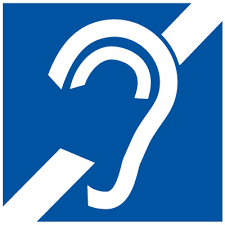Hearing Impairment

The Individuals with Disabilities Education Improvement Act of 2004, formerly the Education of the Handicapped Act (P.L. 94-142), includes "hearing impairment" and "deafness" as two of the categories under which children with disabilities may be eligible for special education and related service programming. While the term "hearing impairment" is often used generically to describe a wide range of hearing losses including deafness, the regulations for IDEA define hearing loss and deafness separately.
Hearing impairment is defined by IDEA as "an impairment in hearing, whether permanent or fluctuating, that adversely affects a child's educational performance."
Deafness is defined as "a hearing impairment that is so severe that the child is impaired in processing linguistic information through hearing, with or without amplification."
Thus, deafness may be viewed as a condition that prevents an individual from receiving sound in all or most of its forms. In contrast, a child with hearing loss can generally respond to auditory stimuli, including speech.
In Montana: The percentage of Montana students ages 6-21 with hearing impairments in 2011 was .05%
Nationally: The U.S. Department of Education reports 5,971,495 students receiving special education services in the 2003-2004 school year. Of that number, roughly 1.2%, or 71,903 students, received special education services based on a classification of hearing impairments.
Deafness
IDEA defines deafness as a hearing impairment that is so severe that the student is impaired in processing linguistic information through hearing, with or without amplification, that adversely affects the student’s educational performance.
In Montana: There are 16,554 individuals aged 18-64 who are deaf.
Nationally: About 2 to 3 out of every 1,000 children in the United States are born with a detectable level of hearing loss in one or both ears.
Resources
Montana Association of the Deaf
Montana School for the Deaf & Blind
Montana Speech-Language-Hearing Association
Scottish Rite Childhood Language Disorders Clinics:
Eugene F. Herman Scottish Rite Childhood Language Disorders Clinic
Scottish Rite Temple
514 14th St. West
Billings, MT 59102
Telephone: (406) 259-1680
Fax: (406) 259-1777
srldc@wtp.net
Scottish Rite Childhood Language Disorders Clinic
Scottish Rite Temple
1304 13th Street South
Great Falls, MT 59405-4611
Telephone: (406) 727-1088
Fax: (406) 452-2063
Western Montana Scottish Rite Childhood Language Disorders Clinic
The University of Montana Curry Health Center
634 Eddy Avenue
Missoula, MT 59801
Telephone: (406) 243-5261 or or 406-243-5467
Fax: (406) 243-4730
lucy.hartpaulson@mso.umt.edu or rosemary.johnson@mso.umt.edu
American Society for Deaf Children
ASDC is the premier source of information for people who must make decisions about deaf children: providers, educators, legislators, and advocates. The site includes a knowledge center with different sections for school personnel and parents and families.
Baylor University’s Robbins College of Health and Human Sciences
- Speech Pathology Department
- Using Music to Support Language Development in Children with Hearing Loss
Beginnings
This organization provides support to families and professionals around hearing loss and deafness. The Beginnings website features guidance for parents and teachers on hearing loss and deafness among school aged children. Information for teachers includes answers to FAQs and general tips for the classroom.
Classroom Acoustics- American Speech-Language-Hearing Association
Deafness and Hearing Loss- Center for Parent Information Resources (CPIR)
Deafness and Hearing Loss Fact Sheet- National Dissemination Center for Children with Disabilities
Help for Parents of Children with Hearing Loss- Centers for Disease Control and Prevention (CDC)
Intertribal Deaf Council
Preserves and carries out traditions, languages and cultures of First Nations deaf, deaf-blind and hard of hearing people. Provides information exchange, traditional and education activities, and awareness activities for non-Native and/or non-deaf people.
Laurent Clerc National Deaf Education Center
The Laurent Clerc National Deaf Education Center at Gallaudet University provides information, training, and technical assistance for parents and professionals to meet the needs of deaf and hard of hearing children.
National Association of the Deaf
National Association of Special Education Teachers: Hearing Impairment
This site contains information for parents and teaching professionals on classroom accommodations/modifications, individual hearing assessment, assistive technology, classroom management, and more.
National Deaf Center on Postsecondary Outcomes
The National Deaf Center on Postsecondary Outcomes (NDC) is a technical assistance and dissemination center funded by the Department of Education’s Office of Special Education Programs (OSEP).
National Center for Hearing Assessment & Management
National Institute on Deafness and Other Communication Disorders (NIDCD)- US Department of Health and Human Services
Noise-Induced Hearing Loss- Centers for Disease Control and Prevention (CDC)

